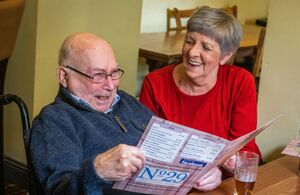UK Government backs scheme to make pubs 'dementia friendly'
University of Stirling researchers - part-funded by 拢7.25m UK Government investment - pioneer programme to make pubs, cafes and restaurants more inclusive

Mary Connelly enjoys a pub lunch with husband Richard, who has dementia
-
Scheme will see more venues introduce simple menus and have 鈥榪uiet table鈥� provision
-
Training for staff to ensure increased inclusion for people with dementia and their families
-
UK Government supports associated improvements for ageing population with 拢7.25m funding
A drive to make pubs, restaurants and caf茅s across the UK聽more dementia-friendly has been launched by Scottish experts聽researching the impact of ageing.
The University of Stirling鈥檚 internationally-renowned聽Dementia聽Services Development Centre (DSDC) has developed a certification scheme that will encourage pub and restaurant owners to make adaptations for people with age-related degenerative conditions.
The voluntary scheme will make the spaces more accessible to people with conditions such as dementia and Alzheimer鈥檚 so that they can enjoy going out with their families and carers.

Balhousie Brookfield care manager Lisa Thomson with University of Stirling academic Lesley Palmer
The aim is to create a Google map to chart all聽dementia-friendly facilities across the UK. Establishments would bear a badge to show they鈥檝e considered things like a clear line of sight to the bar, clearly signposted toilets, some private and quieter tables, easy-to-read menus and staff with an understanding聽of the condition to give customers the support they require.
The University is keen to break down social barriers associated with dementia. Their scheme sits in tandem with the new Intergenerational Living Innovation Hub,聽part-funded by 拢7.25 million from the UK Government through the Stirling and Clackmannanshire City Region Deal, to pioneer technologies for an ageing society.
Lesley Palmer, the University of Stirling鈥檚 Acting Director of聽DSDC, said:
We have long accepted that there should be no barriers for people with wheelchairs. Similarly, there should be no barriers for people with聽dementia 鈥� they should be able to go out for a drink or a meal without stigma and feel comfortable.
The scheme is entirely voluntary for owners, and by making relatively small and inexpensive adaptations, pubs and restaurants can become accredited.

UK Government Minister for Scotland Malcolm Offord has welcomed the scheme.
UK Government Scotland Office Minister Malcolm Offord recently toured聽the聽Dementia聽Services Development Centre, to learn how the University鈥檚 research has brought important changes to approaches to ageing and dementia worldwide. He said:
I saw first-hand how the solutions pioneered at the University of Stirling will make life easier for our ageing population and we are delighted to be able to support that with more than 拢7m in funding.
Enabling projects like this is exactly what the City Region Deal is all about. Not only does it encourage employment and growth, it鈥檚 also funding research that could make improvements on a global scale.
This scheme will bring great comfort to people with dementia and their families so that they can spend quality time together.
The scheme was born from the University鈥檚 Environments for Ageing and Dementia Design Assessment Tool (EADDAT) which combines the latest research on designing for cognitive change with the expertise of leading architects. It聽is being developed as part of a major drive from the University, backed by the UK Government, to promote intergenerational living.
There are three categories of badges which tell customers to what extent participating pubs, restaurants and cafes have taken measures to make them more聽dementia聽friendly.
Tier one shows customers a venue is聽dementia聽鈥渁ware鈥� and has made small but important innovations to make life easier for people with聽dementia.
A tier two badge means the establishment is聽dementia聽鈥渟upportive鈥� and is awarded when businesses make more comprehensive design changes and DSDC can undertake official accreditation.
A tier three badge is the highest standard and would normally involve a building being聽dementia聽鈥渋nclusive鈥� from its outset with聽dementia-friendly designs incorporated in its construction.
In the same way that wheelchair-friendly badges are known across the globe, this scheme will improve quality of life for the elderly. The scheme is not limited to hospitality outlets with other businesses, care homes, hospitals being encouraged to take part.
Adoption by the hospitality industry will bring enormous benefits to the quality of life of those with聽dementia聽by helping them socialise while enjoying eating and drinking out.
The scheme has been successfully piloted by Transport for London, West Yorkshire local authority Kirklees Council and the Sakura community hospital in Japan.
Establishments wishing to sign up to the scheme can find more details .
Case study
Residents of Balhousie Brookfield Care Home in Carnoustie, Angus, are regulars at the Kinloch Arms in the town.
Care workers often take residents in for lunch or a quick drink, and find pub manager Rob Alcock always willing to help. He鈥檚 welcomed the scheme. He said:
The residents of the Balhousie Brookfield Care Home enjoy coming in for a drink or a meal with their families or carers and it鈥檚 lovely to see. They are very valued customers. To me, it makes sense to make our pubs and restaurants more welcoming to those with dementia.

Kinloch Arms pub manager Rob Alcock displays the 'dementia friendly' decal at his bar
Mary Connolly, 74, used to visit the Kinloch with husband Richard, 80, who has been suffering from dementia for the past seven years. Great-grandad of two Richard is now in full-time care at Balhousie Care Group鈥檚 Brookfield but Mary notices a distinct improvement in his recollections when he visits the pub. She said:
I think this is a fantastic scheme to make places more aware of the condition and have patience with people. Just a few measures, like having quieter tables available and staff with an understanding of dementia will make a tremendous difference.
Richard and I used to go to the Kinloch Arms together and it鈥檚 lovely to be in there with him now and see how the familiar environment brings back memories for him. Those moments are very precious to me and our family.
This illness is very cruel 鈥� it robs families like ours of our loved ones. Going out for lunch in a known place is a simple pleasure for Richard and I welcome with open arms anything that will make that easier.
Notes to editors:
Examples of changes pubs, cafes and restaurants can incorporate to make them聽dementia聽friendly:
-
Making sure the bar can be seen on arrival in the pub 鈥� a clear line of sight reduces the stress of a person with聽dementia.
-
Clear signage for drinks, drinks visible in fridges, produce displayed in glass-fronted cabinets 鈥� people with聽dementia聽find it easier to understand visual clues.
-
Range of seating聽 styles 鈥� bar stools may be inappropriate for people with mobility issues while booths or screening may provide welcome privacy and reduce noise.
-
Noisy kitchen areas located away from areas where customers gather 鈥� excess noise can be confusing for people with聽dementia聽or hearing impediment.
-
Clearly marked menus with images聽 of the food鈥�/drink on offer.
-
Toilets visible on arrival and clearly signed from all locations.
-
Staff have an awareness of聽dementia聽and the ability to provide appropriate support.